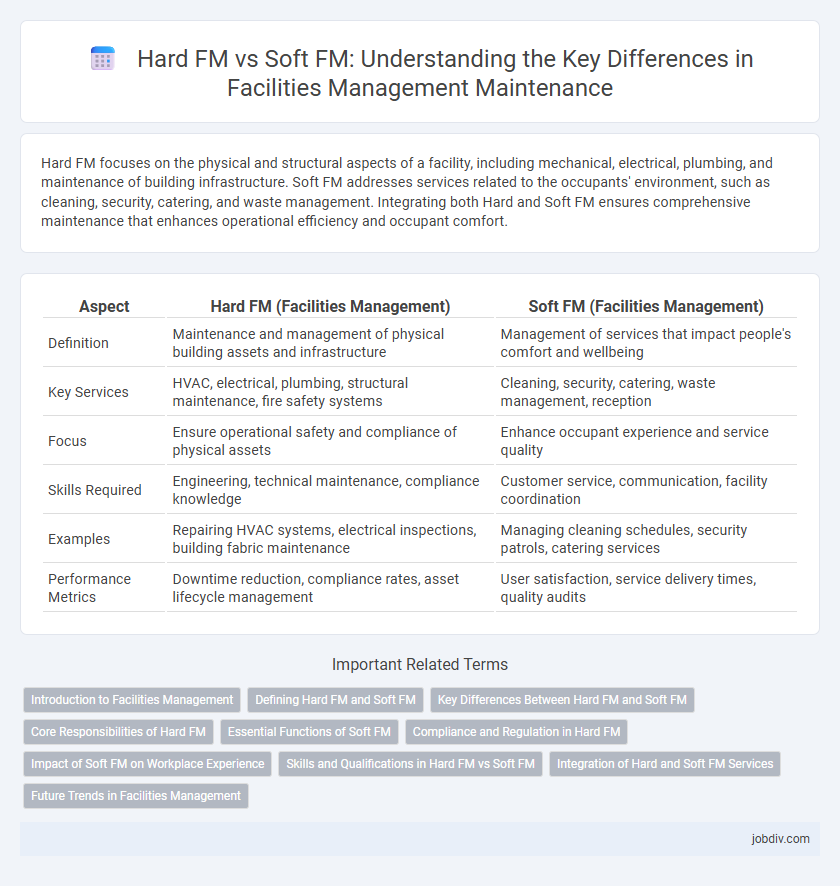Hard FM focuses on the physical and structural aspects of a facility, including mechanical, electrical, plumbing, and maintenance of building infrastructure. Soft FM addresses services related to the occupants' environment, such as cleaning, security, catering, and waste management. Integrating both Hard and Soft FM ensures comprehensive maintenance that enhances operational efficiency and occupant comfort.
Table of Comparison
| Aspect | Hard FM (Facilities Management) | Soft FM (Facilities Management) |
|---|---|---|
| Definition | Maintenance and management of physical building assets and infrastructure | Management of services that impact people's comfort and wellbeing |
| Key Services | HVAC, electrical, plumbing, structural maintenance, fire safety systems | Cleaning, security, catering, waste management, reception |
| Focus | Ensure operational safety and compliance of physical assets | Enhance occupant experience and service quality |
| Skills Required | Engineering, technical maintenance, compliance knowledge | Customer service, communication, facility coordination |
| Examples | Repairing HVAC systems, electrical inspections, building fabric maintenance | Managing cleaning schedules, security patrols, catering services |
| Performance Metrics | Downtime reduction, compliance rates, asset lifecycle management | User satisfaction, service delivery times, quality audits |
Introduction to Facilities Management
Hard FM encompasses the physical, structural maintenance and management of buildings, including HVAC systems, electrical, plumbing, and fire safety equipment. Soft FM involves services that support the occupants and enhance the workplace environment, such as cleaning, security, catering, and reception. Effective Facilities Management integrates both Hard and Soft FM to ensure operational efficiency, safety, and occupant satisfaction within a facility.
Defining Hard FM and Soft FM
Hard FM in facilities management encompasses the physical, structural, and infrastructural elements such as HVAC systems, plumbing, electrical maintenance, and building fabric repairs. Soft FM refers to services that enhance the workplace environment and occupant experience, including cleaning, security, waste management, and catering services. Both Hard and Soft FM are essential to comprehensive facilities management strategies ensuring operational efficiency and occupant well-being.
Key Differences Between Hard FM and Soft FM
Hard FM involves the maintenance of physical assets like HVAC systems, electrical installations, plumbing, and building fabric, ensuring compliance with health and safety regulations. Soft FM focuses on services such as cleaning, security, waste management, and landscaping that enhance occupant comfort and operational efficiency. Key differences lie in the tangible nature of Hard FM tasks requiring technical expertise versus the service-oriented approach of Soft FM demanding management of personnel and service quality.
Core Responsibilities of Hard FM
Hard FM (Facilities Management) primarily focuses on the maintenance and management of physical building infrastructure, including electrical, plumbing, HVAC systems, and structural integrity. Core responsibilities encompass scheduled inspections, repair work, compliance with safety regulations, and energy management to ensure operational efficiency. Hard FM delivers critical support that sustains the functionality and safety of the built environment, distinguishing it from Soft FM, which centers on services like cleaning, security, and catering.
Essential Functions of Soft FM
Soft FM in facilities management encompasses essential functions such as cleaning services, security, catering, waste management, and reception services, which ensure a comfortable and safe environment for building occupants. These services support organizational productivity by enhancing employee well-being, safety, and satisfaction, directly impacting operational efficiency. Unlike Hard FM, which deals with physical infrastructure maintenance, Soft FM focuses on the human-centric aspects that maintain daily organizational functionality.
Compliance and Regulation in Hard FM
Hard FM in Facilities Management focuses on compliance with stringent regulations related to building safety, health, and environmental standards, including fire safety, electrical systems, and structural integrity. Adhering to legal requirements such as OSHA, building codes, and ISO standards ensures the operational reliability and legal accountability of physical assets. Soft FM typically addresses non-technical services, while Hard FM manages regulatory risk through proactive maintenance and inspections.
Impact of Soft FM on Workplace Experience
Soft FM services, including cleaning, security, and catering, significantly enhance workplace experience by promoting employee well-being and satisfaction. These services create a comfortable, safe, and hygienic environment that boosts productivity and reduces absenteeism. Unlike Hard FM, which focuses on physical infrastructure maintenance, Soft FM directly influences daily employee interactions and overall workplace ambiance.
Skills and Qualifications in Hard FM vs Soft FM
Hard FM requires technical skills and qualifications in engineering, construction, and systems maintenance, often demanding certifications such as HVAC, electrical, or plumbing licenses. Soft FM emphasizes interpersonal, administrative, and organizational skills, with qualifications in customer service, health and safety, and cleaning management. Professionals in Hard FM focus on infrastructure and equipment upkeep, while Soft FM practitioners excel in managing services that support occupant well-being and facility usability.
Integration of Hard and Soft FM Services
Effective integration of Hard FM and Soft FM services enhances operational efficiency and occupant satisfaction by ensuring that maintenance of physical infrastructure and support services are seamlessly coordinated. Combining Hard FM tasks like HVAC maintenance, electrical repairs, and building fabric upkeep with Soft FM services such as cleaning, security, and catering enables a holistic approach to facilities management. This integrated model reduces downtime, optimizes resource allocation, and delivers a healthier, safer environment for building users.
Future Trends in Facilities Management
Hard FM focuses on the management of physical assets such as HVAC, electrical, and plumbing systems, while Soft FM involves services like cleaning, security, and catering. Future trends in facilities management emphasize the integration of IoT and AI to enable predictive maintenance and enhance operational efficiency. Sustainability and smart building technologies will drive the evolution of both Hard and Soft FM practices, promoting energy efficiency and occupant well-being.
Hard FM (Facilities Management) vs Soft FM (Facilities Management) Infographic

 jobdiv.com
jobdiv.com